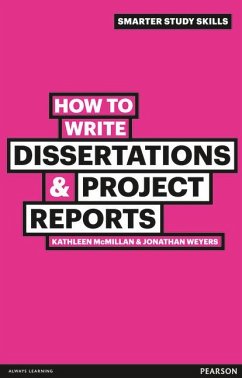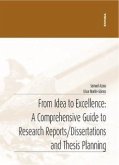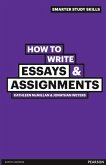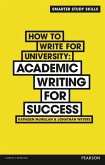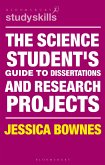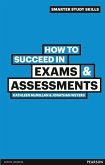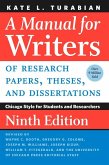- Broschiertes Buch
- Merkliste
- Auf die Merkliste
- Bewerten Bewerten
- Teilen
- Produkt teilen
- Produkterinnerung
- Produkterinnerung
Fully updated since first publication in 2007, and with extended and revised sections in key areas such as Plagiarism & Copyright, Ethics in research, and Citing & Referencing, How to write Dissertations & Research Projects will allow a student to assess and address their particular weaknesses in researching and writing dissertations and longer pieces of coursework and delivers detailed tips, techniques and strategies to enable them to significantly improve their abilities and performance in time to make a difference.
Andere Kunden interessierten sich auch für
![From Idea to Excellence: A Comprehensive Guide to Research Reports/Dissertations and Thesis Planning From Idea to Excellence: A Comprehensive Guide to Research Reports/Dissertations and Thesis Planning]() From Idea to Excellence: A Comprehensive Guide to Research Reports/Dissertations and Thesis Planning10,99 €
From Idea to Excellence: A Comprehensive Guide to Research Reports/Dissertations and Thesis Planning10,99 €![How to Write Essays & Assignments How to Write Essays & Assignments]() Kathleen McMillanHow to Write Essays & Assignments23,99 €
Kathleen McMillanHow to Write Essays & Assignments23,99 €![How to Write for University How to Write for University]() Kathleen McMillanHow to Write for University25,99 €
Kathleen McMillanHow to Write for University25,99 €![The Science Student's Guide to Dissertations and Research Projects The Science Student's Guide to Dissertations and Research Projects]() Jessica BownesThe Science Student's Guide to Dissertations and Research Projects26,99 €
Jessica BownesThe Science Student's Guide to Dissertations and Research Projects26,99 €![How to Succeed in Exams & Assessments How to Succeed in Exams & Assessments]() Kathleen McMillanHow to Succeed in Exams & Assessments23,99 €
Kathleen McMillanHow to Succeed in Exams & Assessments23,99 €![Manual for Writers of Research Papers, Theses, and Dissertations Manual for Writers of Research Papers, Theses, and Dissertations]() Kate L. TurabianManual for Writers of Research Papers, Theses, and Dissertations18,99 €
Kate L. TurabianManual for Writers of Research Papers, Theses, and Dissertations18,99 €![How to Write Essays and Dissertations How to Write Essays and Dissertations]() Alan DurantHow to Write Essays and Dissertations56,99 €
Alan DurantHow to Write Essays and Dissertations56,99 €-
-
-
Fully updated since first publication in 2007, and with extended and revised sections in key areas such as Plagiarism & Copyright, Ethics in research, and Citing & Referencing, How to write Dissertations & Research Projects will allow a student to assess and address their particular weaknesses in researching and writing dissertations and longer pieces of coursework and delivers detailed tips, techniques and strategies to enable them to significantly improve their abilities and performance in time to make a difference.
Produktdetails
- Produktdetails
- Smarter Study Skills
- Verlag: Pearson Education Limited
- 2 ed
- Seitenzahl: 312
- Erscheinungstermin: 30. Juni 2011
- Englisch
- Abmessung: 217mm x 139mm x 20mm
- Gewicht: 340g
- ISBN-13: 9780273743835
- ISBN-10: 027374383X
- Artikelnr.: 32559131
- Herstellerkennzeichnung
- Libri GmbH
- Europaallee 1
- 36244 Bad Hersfeld
- gpsr@libri.de
- Smarter Study Skills
- Verlag: Pearson Education Limited
- 2 ed
- Seitenzahl: 312
- Erscheinungstermin: 30. Juni 2011
- Englisch
- Abmessung: 217mm x 139mm x 20mm
- Gewicht: 340g
- ISBN-13: 9780273743835
- ISBN-10: 027374383X
- Artikelnr.: 32559131
- Herstellerkennzeichnung
- Libri GmbH
- Europaallee 1
- 36244 Bad Hersfeld
- gpsr@libri.de
Kathleen McMillan and Jonathan Weyers work within the University of Dundees Learning Centre and Academic Affairs Office respectively and have each been teaching for over 25 years and now specialize in supporting academic skills across both the arts and sciences.
Introduction
1. Tackling a dissertation or project report: how to make the best possible
start
2. Choosing a dissertation or project report: how to decide on a theme for
your investigation
Planning your research
3. Writing a proposal: how to structure a successful dissertation or
research proposal
4. Time management: how to write your dissertation or project while
balancing family, work and leisure
5. Planning for dissertations: how to begin your research and evolve a
model for your writing
6. Planning for experimental projects: how to organise your efforts
effectively
Finding and filtering information
7. Information literacy: how to make the best use of the library resources
8. Effective academic reading: how to read efficiently and with
understanding
9. Analysing and evaluating source material: how to filter and select
relevant material as part of the research process
10. Note-making from source material: how to create effective notes to
support your dissertation and project research
Applying research techniques
11. Principles of quantitative research: how to obtain and analyse
numerical information
12. Principles of qualitative research: how to obtain and analyse
descriptive information
13.Experimental research and field visits: how to develop and apply your
skills
14. Thinking critically: how to develop a logical approach to analysis and
problem-solving
Working with Data & Numbers
15. Number crunching: how to solve problems in arithmetic and algebra
16. Interpreting and presenting data: how to understand & produce graphs,
tables & basic statistics
Addressing issues of plagiarism, referencing amd ethics
17. Plagiarism and copyright infringement: how to avoid being accused of
stealing the ideas and work of others
18. Citing and listing references: how to refer appropriately to the work
of others
19. Ethics in researching and reporting: how to follow good research
practice
Writing a first draft
20. Structuring a dissertation: how to organise your writing within a
standard framework
21. Structuring a project report: how to select and shape your content
appropriately
22. Academic writing style: how to adopt appropriate language conventions
Editing, revising and presenting
25. Reviewing, editing and proof-reading: how to make sure that your
writing is concise and correct
26. Exploiting feedback: how to understand and learn from what your
supervisor writes on your work
27. Presentation of dissertations and reports: how to follow the
appropriate academic conventions
References and further reading
Glossary
1. Tackling a dissertation or project report: how to make the best possible
start
2. Choosing a dissertation or project report: how to decide on a theme for
your investigation
Planning your research
3. Writing a proposal: how to structure a successful dissertation or
research proposal
4. Time management: how to write your dissertation or project while
balancing family, work and leisure
5. Planning for dissertations: how to begin your research and evolve a
model for your writing
6. Planning for experimental projects: how to organise your efforts
effectively
Finding and filtering information
7. Information literacy: how to make the best use of the library resources
8. Effective academic reading: how to read efficiently and with
understanding
9. Analysing and evaluating source material: how to filter and select
relevant material as part of the research process
10. Note-making from source material: how to create effective notes to
support your dissertation and project research
Applying research techniques
11. Principles of quantitative research: how to obtain and analyse
numerical information
12. Principles of qualitative research: how to obtain and analyse
descriptive information
13.Experimental research and field visits: how to develop and apply your
skills
14. Thinking critically: how to develop a logical approach to analysis and
problem-solving
Working with Data & Numbers
15. Number crunching: how to solve problems in arithmetic and algebra
16. Interpreting and presenting data: how to understand & produce graphs,
tables & basic statistics
Addressing issues of plagiarism, referencing amd ethics
17. Plagiarism and copyright infringement: how to avoid being accused of
stealing the ideas and work of others
18. Citing and listing references: how to refer appropriately to the work
of others
19. Ethics in researching and reporting: how to follow good research
practice
Writing a first draft
20. Structuring a dissertation: how to organise your writing within a
standard framework
21. Structuring a project report: how to select and shape your content
appropriately
22. Academic writing style: how to adopt appropriate language conventions
Editing, revising and presenting
25. Reviewing, editing and proof-reading: how to make sure that your
writing is concise and correct
26. Exploiting feedback: how to understand and learn from what your
supervisor writes on your work
27. Presentation of dissertations and reports: how to follow the
appropriate academic conventions
References and further reading
Glossary
Introduction
1. Tackling a dissertation or project report: how to make the best possible
start
2. Choosing a dissertation or project report: how to decide on a theme for
your investigation
Planning your research
3. Writing a proposal: how to structure a successful dissertation or
research proposal
4. Time management: how to write your dissertation or project while
balancing family, work and leisure
5. Planning for dissertations: how to begin your research and evolve a
model for your writing
6. Planning for experimental projects: how to organise your efforts
effectively
Finding and filtering information
7. Information literacy: how to make the best use of the library resources
8. Effective academic reading: how to read efficiently and with
understanding
9. Analysing and evaluating source material: how to filter and select
relevant material as part of the research process
10. Note-making from source material: how to create effective notes to
support your dissertation and project research
Applying research techniques
11. Principles of quantitative research: how to obtain and analyse
numerical information
12. Principles of qualitative research: how to obtain and analyse
descriptive information
13.Experimental research and field visits: how to develop and apply your
skills
14. Thinking critically: how to develop a logical approach to analysis and
problem-solving
Working with Data & Numbers
15. Number crunching: how to solve problems in arithmetic and algebra
16. Interpreting and presenting data: how to understand & produce graphs,
tables & basic statistics
Addressing issues of plagiarism, referencing amd ethics
17. Plagiarism and copyright infringement: how to avoid being accused of
stealing the ideas and work of others
18. Citing and listing references: how to refer appropriately to the work
of others
19. Ethics in researching and reporting: how to follow good research
practice
Writing a first draft
20. Structuring a dissertation: how to organise your writing within a
standard framework
21. Structuring a project report: how to select and shape your content
appropriately
22. Academic writing style: how to adopt appropriate language conventions
Editing, revising and presenting
25. Reviewing, editing and proof-reading: how to make sure that your
writing is concise and correct
26. Exploiting feedback: how to understand and learn from what your
supervisor writes on your work
27. Presentation of dissertations and reports: how to follow the
appropriate academic conventions
References and further reading
Glossary
1. Tackling a dissertation or project report: how to make the best possible
start
2. Choosing a dissertation or project report: how to decide on a theme for
your investigation
Planning your research
3. Writing a proposal: how to structure a successful dissertation or
research proposal
4. Time management: how to write your dissertation or project while
balancing family, work and leisure
5. Planning for dissertations: how to begin your research and evolve a
model for your writing
6. Planning for experimental projects: how to organise your efforts
effectively
Finding and filtering information
7. Information literacy: how to make the best use of the library resources
8. Effective academic reading: how to read efficiently and with
understanding
9. Analysing and evaluating source material: how to filter and select
relevant material as part of the research process
10. Note-making from source material: how to create effective notes to
support your dissertation and project research
Applying research techniques
11. Principles of quantitative research: how to obtain and analyse
numerical information
12. Principles of qualitative research: how to obtain and analyse
descriptive information
13.Experimental research and field visits: how to develop and apply your
skills
14. Thinking critically: how to develop a logical approach to analysis and
problem-solving
Working with Data & Numbers
15. Number crunching: how to solve problems in arithmetic and algebra
16. Interpreting and presenting data: how to understand & produce graphs,
tables & basic statistics
Addressing issues of plagiarism, referencing amd ethics
17. Plagiarism and copyright infringement: how to avoid being accused of
stealing the ideas and work of others
18. Citing and listing references: how to refer appropriately to the work
of others
19. Ethics in researching and reporting: how to follow good research
practice
Writing a first draft
20. Structuring a dissertation: how to organise your writing within a
standard framework
21. Structuring a project report: how to select and shape your content
appropriately
22. Academic writing style: how to adopt appropriate language conventions
Editing, revising and presenting
25. Reviewing, editing and proof-reading: how to make sure that your
writing is concise and correct
26. Exploiting feedback: how to understand and learn from what your
supervisor writes on your work
27. Presentation of dissertations and reports: how to follow the
appropriate academic conventions
References and further reading
Glossary

